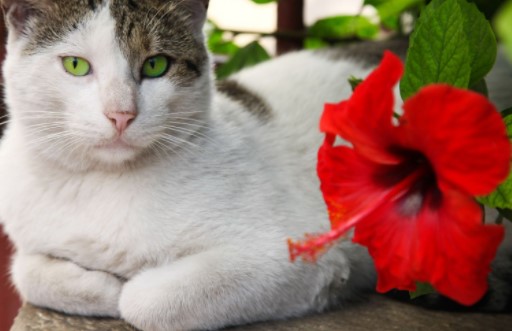Are you worried about your pets sneaking into your Hibiscus plant? It has no permanent solution other than getting rid of it, but you can be mentally prepared for outcomes that can hurt your pets. Cats and dogs get attracted to blossoming Hibiscus flowers, and when they eat them, it may prove threatening for their life.
Get ready for learning the side effects of eating Hibiscus by pet animals and how to deal with them. This article also contains precautions you need to take while having pets and plants both at home. Pets are your responsibility, so you have to take good care of them.
Contents
- Hibiscus Plant and Pets
- All Species are Non-toxic Except Rose of Sharon
- Symptoms of Hibiscus Poisoning
- Symptoms include
- Diagnosis
- Treatment
- Detoxification
- Evacuation
- Medication
- Precautions to Take While Having Both Pets and Plants at Home
- FAQs
- What to do if my dog ate a Hibiscus?
- Can Hibiscus kill cats?
- Which part of Hibiscus is more toxic?
- Conclusion
Hibiscus Plant and Pets
Not all species of Hibiscus are toxic, but Hibiscus Syriacus is. This article is about the rose of Sharon (Hibiscus Syriacus poisoning and how to deal with your pet if he has eaten the toxic hibiscus plant.
All Species are Non-toxic Except Rose of Sharon
There exist 679 species of Hibiscus plant. And all of them are non-toxic except one. This single species is the most common among all indoor and outdoor species of beautiful, versatile and colourful Hibiscus plants. This is the rose of Sharon, which is also known as Hibiscus Syriacus.

It is a toxic and poisonous species for pet animals, especially furry animals, cats and dogs. This plant contains asparagine which is an amino acid and is responsible for causing vomiting, diarrhoea and mouth blistering and burning.
There are other substances present in the roots that have shown toxicity to the dogs. Although they have not yet been identified, it is said that they produce similar symptoms like the symptoms of eating flowers and leaves. Try not to allow your dog to snack on these attractive flowers and the other parts of this plant.
Symptoms of Hibiscus Poisoning
The symptoms vary from mild to severe, and it depends on your pet's natural health condition and the part of the plant eaten. Eating the roots makes the most severe symptoms, whereas eating the flower doesn't create many severe symptoms but only mild symptoms which at times lead to severe cases.
Symptoms include
- Nausea and vomiting
- Diarrhoea
- Throat burning
- Eye pain
- Swelling of cornea
- Blistering inside the mouth
- Coughing
- Swelling In throat and mouth
- Blistering around tongue
- Inability to ingest (if swelling increases)
Diagnosis
Diagnoses is made by asking several questions from the owner. Your doctor would ask about the symptoms of your pet. He would ask about behavioural changes in the pet. The veterinary doctors will entirely check the pet physically and make its inquiry.
After physical examination, the doctor will perform laboratory tests, including urine and stool tests, blood urea nitrogen, complete blood count, comprehensive profile of chemicals in your pet's blood and liver tests. He will also check for dehydration if the vomiting and diarrhoea are severe.
In extreme circumstances, your dog's vet will perform an endoscopy to check the throat and upper airways. He may decide to go for an x-ray and ultrasound for a more detailed and proper check-up.
Treatment
After making a proper diagnosis, the doctor will provide adequate treatment to your animal, which generally includes detoxification and evacuation.
Detoxification
Detoxification is the infusion of intravenous fluids for the flushing of kidneys. It also helps in the prevention of dehydration that happens from vomiting and diarrhoea. To avoid more damage by eating Hibiscus, detoxification is of high importance.
Evacuation
It is the chemical solution given to the dog that contains specific chemicals to induce vomiting. In this way, all the toxins are removed from the stomach. The chemical substances include ipecac and peroxide solution. After this induced vomiting, the sick animal is given charcoal orally so that the remaining poisons are absorbed and eliminated.
Medication
At the end of the procedure, medication is given as a topical treatment. Creams are given for the application on the burns and blisters. If there is an extreme symptom of blistering in the mouth, it is possible that the doctor provides cortisone injection and would give you a spray for the application on blisters.
Precautions to Take While Having Both Pets and Plants at Home
- Make sure to keep your pets away from your garden.
- Do not allow them to munch on attractive and colourful fruits and flowers in the lawn.
- Keep an eye on the changing behaviours of the pet you have.
- Make sure to spray your plants with pepper to avoid them being eaten by pet animals.
- Take extra care if you have poisonous plants at home.
- Do complete research on which plants are toxic to your pet animals.
- Please keep them in a particular safest place out of reach of your pets.
FAQs
What to do if my dog ate a Hibiscus?
Can Hibiscus kill cats?
Which part of Hibiscus is more toxic?
Conclusion
Read the above article from top to bottom. Make sure to understand each part to get thorough knowledge. If you have pets in your home, you would not want them to be sick. Keep an eye on them and make sure they remain inside their places to avoid any danger. Check on the poisonous plants and keep them in the top safest place in your home where your pets are not allowed to visit.

